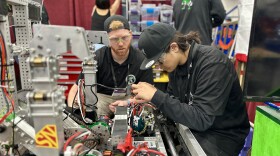Editor's note: NFL media rules required us to remove this video after 24 hours. The transcript from the video remains below.GLORIA PENNER (Host): As the San Diego Chargers continue to climb toward the football playoffs. More controversy surronds the search for a new stadium in San Diego. This time the issue concerns tax-payers. KPBS Reporter Sharon Heilbrunn has the story.
SHARON HEILBRUNN (KPBS Reporter): In football, there's a term known as KISS. It stands for "Keep It Simple Stupid" and it's a philosophy widely used by coaches. But when it comes to bringing a new football stadium to San Diego, you can kiss simplicity goodbye. At least, for now.
HEILBRUNN: The discussion for a new stadium for the San Diego Chargers has now moved to a location in downtown San Diego. For years, the football organization has been discussing stadium options in Chula Vista, Oceanside and Escondido, but the plans never materialized and never included taxpayer money. This time, they do.
MARK FABIANI (Special Counsel, San Diego Chargers): The site downtown is 11 acres, far smaller than the 160 acres at Qualcomm, the 130 plus acres in Chula Vista, Oceanside. Those sites all allowed us to build a development around the stadium that would have helped pay for the stadium. Downtown SD, that's not possible. You're just going to fit the stadium on the site, barely. So where would other money come from? If there's a funding source, probably it's going to be from the public, and the public needs to decide if they want to do that.
HEILBRUNN: I'm standing in front of the Wonderbread building, which is the proposed site for the stadium. It's right next door to Petco Park, and all the infrastructure for a stadium is here -- parking, public transportation, hotels and restaurants. If a stadium is built here, it will be the smallest in the NFL, with just about 64,000 seats. Qualcomm Stadium, which the team considers outdated, is in major debt for the City of San Diego, according to City Councilwoman Donna Frye.
DONNA FRYE (San Diego, City Councilwoman): The city is essentially not getting any money from the Chargers. We're essentially upside down about $430,000 for 3 seasons -- 2005, 6 and 7. I think it'd be great for SD to build a new stadium. I've said that all along. I hope they do. What I don't think would be great is if taxpayers foot the bill.
HEILBRUNN: According to Chargers' Special Council Mark Fabiani, taxpayers would spend more than $300 million just to keep Qualcomm operating through 2020, when the Chargers play out their lease.
FABIANI: The argument isn't about spending money or not spending money. The money is being spent. If you're worried about your potholes, your library hours, your police staff, you should be worried about the $300 million being spent on keeping the Qualcomm site.
HEILBRUNN: Since the City owns the Qualcomm site, the stadium could be torn down and the land could be sold off, or used to build something that generates revenue. But Frye says it's all smoke and mirrors.
FRYE: When this last deal was negotiated, to allegedly get rid of the ticket guarantee, the pitch was very similar. It's already costing you money, so if you just do this deal, it will be better for you. That's until the next deal comes along, and they say if you do this deal, it will be better than the old deal. I don't want to have to make decisions about do we put in a new stadium and cut more parks, libraries, or police officers.
HEILBRUNN: Since the proposed stadium is in the downtown redevelopment area, one funding option could be to use the city's redevelopment funds - which is money earmarked only for redevelopment, and not for things like police and fire operations. However, the Centre City Redevelopment Corporation, OR CCDC, WHICH administers the money, would likely need to raise its cap on how much money it can collect in property taxes to fund a project of this size.
funding new stadiums with public money is not a new idea. Petco Park, the Padres' baseball stadium, was built with public money, as was the new Dallas Cowboys stadium. Fabiani said it would cost about $700 to 800 million to build the downtown stadium, with the Chargers and the NFL putting in about 38 percent of that.
FABIANI: Outside of California, most stadiums are built with public money. The average around the league is 65 percent. In places like Denver, which is similar to SD, it's about 80 percent public funding.
HEILBRUNN: There is another option, one that many people don't like to THINK about.
The Chargers leave town. Qualcomm Stadium is shuttered and the money spent on maintaining Qualcomm be re-routed to other priorities.
Frye says that the cost, just on the debt service from the last time Qualcomm was renovated, is probably about 5.7 million dollars a year.
FRYE: And that goes on through 2020. And then of course you have operations and maintenance. The cost for sports, in this town, are probably at about $20-25 million dollars between the Chargers and Petco annually.
CCDC has paid a consultant $160,000 from its administrative budget to study how the downtown stadium might be financed. That report is expected after the new year. The Chargers have also paid for an analysis of the site. Both reports will answer at least a few of the questions that surround the search for a new stadium.
HEILBRUNN: We want to know if you think public funds should be used to build a stadium in san diego. Log onto Kpbs.org/sdweek and leave us a comment. For KBPS, I’m Sharon Heilbrunn.





